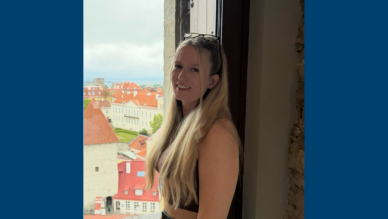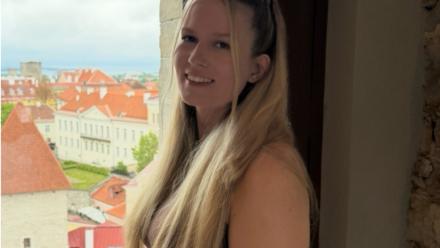After experiencing symptoms on and off for years, Neve was diagnosed with MS during the coronavirus pandemic at the age of 17. Here she shares her experience of coming to terms with the diagnosis, telling family and friends, life at school, and the transition from child to adult MS services in the NHS.
When I was diagnosed at 17, after years of experiencing symptoms like pins and needles and numbness, I felt a sense of relief that I’d been believed. The diagnosis gave me answers to so many questions that I’d had. But I was also in shock. At 17 you don’t think something like MS is going to hit you.
Returning to school, I felt embarrassed about falling over. I felt this was often associated with children and elderly people, not a young person like me. Initially, I only told my teachers about my MS diagnosis (mainly because I had to). However, I had an amazing teacher who was extremely supportive and asked me what support I needed at school.
After I was diagnosed, I did an independent project at school (known as an Extended Project Qualification or EPQ) where I researched and wrote about the impacts of MS and how it can affect you as a child or young person. Doing my EPQ was empowering and now I educate anyone who wants to talk to me about MS.
When I tell people about my MS, I explain it as simply as possible. I use an analogy of a broken charger cable to show how MS damages the nerves in the brain and spinal cord.
One of the most common misconceptions I experience from people when it comes to my MS, is the idea that people think I “look well” on the outside but forget that I could be feeling unwell inside.
People don’t see everything when it comes to living with MS – many symptoms are invisible.
Overall, I found telling people about my MS helpful, and although only one of my friends had heard of MS as their mum had it, they were all supportive.
As I was 17 when I was diagnosed with MS, I was under the care of a paediatric MS service. I had to travel further for this specialist care, but I always ensured it was a nice occasion by making a day of it, getting lunch or a sweet treat while we were out.
The peer support from other young people on the wards helped me to come to terms with my MS diagnosis and taught me different ways to deal with the condition.
Support from the paediatric team was amazing. Everyone was reassuring and gave me recommendations on ways to manage my MS.
I chose to stay in the area I had previously received care from when I transitioned to adult MS services. I continued to travel as I felt I knew the area and had come to terms with the journey time, but I found the transition from paediatric to adult MS services far from easy.
While my dedicated MS nurse within the child services was hands on, supportive, and there whenever I needed, in adult services I was encouraged to be more independent which took a while to adapt to. The MS nurses in the adult service were also a bit slower getting back to me if I had questions.
It was such a change. I had my last treatment in the children’s ward, then my next treatment was in adult services. I found it hard to connect with the other people with MS on the adult ward as they were older than me. I didn’t feel we had much in common. I suddenly went from having this great support network to then being independent and I did find that quite hard.
The nurse was lovely though. She couldn’t have done more for me, but I found it so overwhelming that I cried.
While everyone tried to support me, I felt there was not a good enough bridge to help me slowly transition over to being independent in adult services. Nevertheless, at 17 I felt I was at an age where I could investigate MS myself. I had the tools I needed to understand MS and learn what I needed to do.
MS is like a rollercoaster. Sometimes it feels really scary. But you can also have good days, which you can enjoy with friends and family. You’ve got to remember that although it is up and down, there’s always support out there. Although it seems scary now, six months down the line, you might look back and think, “Look at what I’ve been through and managed to overcome.”
So, live today with no regrets. If today’s a good day, just go for it!




